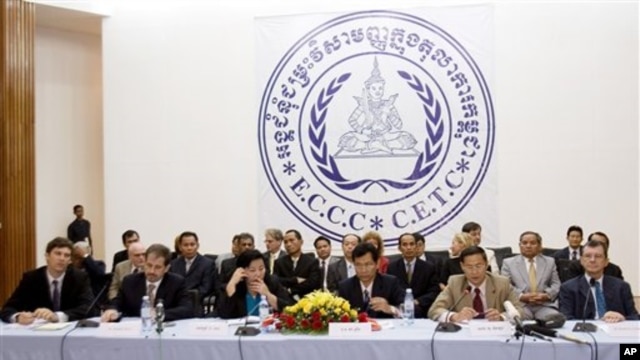15 February 2013
PHNOM PENH — A walkout by Cambodian staff
at the UN-backed Khmer Rouge tribunal could shut down the court’s
entire operation, Cambodian officials warned Thursday.
Cambodian staff at the court have not been paid since December, but without new funding, which has not been forthcoming, there is not enough budget to pay them. Around 200 have threatened to boycott work until they are paid.
If they then make good on the threat, the internal rules of the court dictate that it would have to shut down the international side as well, Ek Tha a spokesman for the Council of Ministers, which oversees the court for the Cambodian government, said Thursday.
Cabinet Minister Sok An met with ambassadors of Japan and the European Union on Wednesday, saying a walkout at the court would mean, according to court rules, “the international side will not be able to work without assistance from the Cambodian side,” Ek Tha said.
Sok An told the ambassadors that fundraising for the court has become harder, due in part to “fatigue” by donor nations, Ek Tha said. “That’s why we cannot provide new contracts to Cambodian staff,” he said.
Tribunal spokesman Neth Pheaktra said the court cannot work if there is only money for the international side. “The operation needs both sides,” he said.
It was unclear whether staff will carry out their threat to boycott work without payment, or how long such a boycott would last. But the latest threat to the functioning of the court comes as it undertakes its most important trial, with three aging leaders—Nuon Chea, Khieu Samphan and Ieng Sary—facing charges of atrocity crimes, including genocide.
Lao Mong Hay, an independent political analyst, said the lack of funding could be due to the international community’s objections to alleged interference in the court’s work by government officials, or because the Cambodian government has not made enough fundraising efforts.
Lao Mong Hay said he does not believe either the Cambodian or international sides of the court will withdraw completely.
The fear is that the funding problem will delay the trial of the three leaders so long that they die before its conclusion, he said.
Cambodian staff at the court have not been paid since December, but without new funding, which has not been forthcoming, there is not enough budget to pay them. Around 200 have threatened to boycott work until they are paid.
If they then make good on the threat, the internal rules of the court dictate that it would have to shut down the international side as well, Ek Tha a spokesman for the Council of Ministers, which oversees the court for the Cambodian government, said Thursday.
Cabinet Minister Sok An met with ambassadors of Japan and the European Union on Wednesday, saying a walkout at the court would mean, according to court rules, “the international side will not be able to work without assistance from the Cambodian side,” Ek Tha said.
Sok An told the ambassadors that fundraising for the court has become harder, due in part to “fatigue” by donor nations, Ek Tha said. “That’s why we cannot provide new contracts to Cambodian staff,” he said.
Tribunal spokesman Neth Pheaktra said the court cannot work if there is only money for the international side. “The operation needs both sides,” he said.
It was unclear whether staff will carry out their threat to boycott work without payment, or how long such a boycott would last. But the latest threat to the functioning of the court comes as it undertakes its most important trial, with three aging leaders—Nuon Chea, Khieu Samphan and Ieng Sary—facing charges of atrocity crimes, including genocide.
Lao Mong Hay, an independent political analyst, said the lack of funding could be due to the international community’s objections to alleged interference in the court’s work by government officials, or because the Cambodian government has not made enough fundraising efforts.
Lao Mong Hay said he does not believe either the Cambodian or international sides of the court will withdraw completely.
The fear is that the funding problem will delay the trial of the three leaders so long that they die before its conclusion, he said.


No comments:
Post a Comment